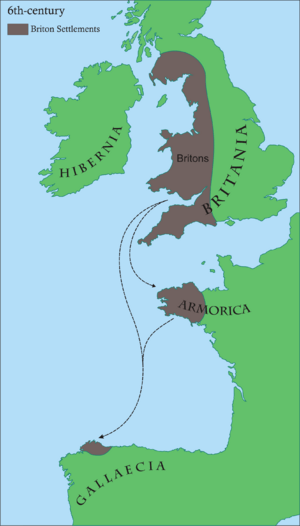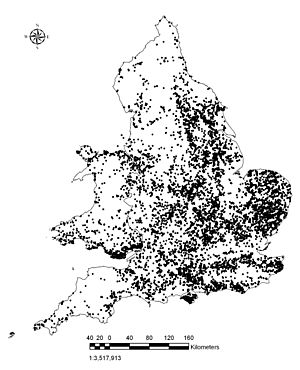Romano-British culture facts for kids
The Romano-British culture was a special mix of Roman and local British ways of life. It started in Britain after the Romans took over in AD 43 and created the province of Britannia. It was like blending Roman culture with the traditions of the native Britons, who spoke a Celtic language.
Even after the Roman armies left around 410 AD, and up until St Augustine arrived in 597 AD, many historians think that southern Britain kept a strong "sub-Roman" culture. This culture even survived attacks from the Anglo-Saxons and people continued to use a form of Latin for writing.
Contents
Romans Arrive in Britain
Roman soldiers, mostly from nearby areas, invaded Britain in AD 43. This happened during the time of Emperor Claudius. Over the next few years, the Romans created the province of Britannia. This province eventually covered all of what is now England and Wales, plus parts of Scotland.
The Roman army quickly took over Colchester. Eleven local British kings also gave up to the Romans. By AD 47, the Romans had claimed southern Britain. This area had many valuable natural resources, which made the Roman Empire richer. The Romans helped Colchester grow into a city with new public buildings.
The Roman army, along with their families, totaled about 125,000 people. This was out of Britannia's total population of 3.6 million by the late 300s. Many other people also moved to Britain, like sculptors from Roman Syria and doctors from the Eastern Mediterranean. The cultures and religions in Roman Britain became more diverse. While most people were still Celtic, more and more adopted Roman ways.
Most people in Britain lived in the countryside and worked in farming. Out of 3.6 million people, only about 240,000 lived in cities. The capital city, Londinium (modern London), had about 60,000 people. Londinium was a very diverse city. People came from all over the Roman Empire, including native Britons, people from continental Europe, the Middle East, and North Africa. Other Roman-British towns were also diverse, thanks to people moving there from other Roman lands.
Christianity arrived in Britain in the 200s. One famous early Christian was Saint Alban. People say he was killed near the Roman town of Verulamium (now St Albans) during the rule of Emperor Decius.
Becoming a Roman Citizen
One big change the Romans brought was the idea of Roman citizenship. At first, only a few people could become citizens. These included town council members, retired soldiers (both legionaries and auxiliary soldiers), and some native Britons whose powerful friends helped them get citizenship.
Over time, more and more people from the provinces became citizens. One common way was to serve in the Roman army or on a city council. The number of citizens grew steadily. Finally, in 212 or early 213 AD, Emperor Caracalla issued the Constitutio Antoniniana. This law made almost everyone living in the Roman provinces a citizen, except for slaves.
Being a Roman citizen had many benefits. Citizens could make their own choices, ask for legal protection, and share in community life under Roman law. People who were not citizens were called Peregrini. They lived under their own traditional laws. They could not own land with a Roman title or serve as a legionary soldier.
Romans Leave Britain
Eventually, the Roman emperor Honorius ordered Roman troops to return home. He needed them to help defend Italy from invaders. Another leader, Constantine III, also took more troops from Britain to Gaul (modern France).
After the Romans left Britain, Emperor Honorius told the Romano-British people to "look to their own defenses." They sent a desperate message, known as the Groans of the Britons, asking for help. They might have received some naval support for a short time, but mostly, they were on their own.
After the Romans Left

In the years right after the Romans left, the lowlands and cities of Britain might have had some kind of local government or "council." The Bishop of London seemed to be important. However, the region became politically divided. Former soldiers, hired fighters, nobles, officials, and farmers all declared themselves kings. They fought among themselves, which left Britain open to attacks.
Two main groups may have formed: one that wanted to keep Roman ways, and another that wanted full independence. One leader from this time, known by name, was Vortigern. This might have been a title meaning "High King."
Attacks from the Picts (from the north) and the Scotti (Scots from Ireland) forced the Britons to ask for help. They turned to pagan Germanic tribes like the Angles, Saxons, and Jutes. These tribes then decided to settle in Britain themselves. Some Romano-British people moved away to places like Brittany, the Kingdom of the Suebi (in modern Spain), and possibly Ireland.
The Anglo-Saxons took control of eastern England in the 400s. In the mid-500s, they began to expand into the Midlands. Then, in the 600s, they moved into the southwest and north of England. The parts of southern Britain that were not conquered, especially Wales, kept their Romano-British culture. They especially held onto Christianity. People who spoke Germanic languages also moved into southern Great Britain. There was a lot of cultural exchange between these Germanic settlers and the remaining Romano-British people.
Some old Anglo-Saxon histories called the Romano-British people "Welsh." This word comes from an Old English word meaning 'foreigner'. It referred to the original people of southern Britain. Historically, Wales and the southwest of England were known as North Wales and West Wales. The Celtic north of England and southern Scotland was called Hen Ogledd ("old north") in Welsh.
The struggles of this time led to the famous legends of Uther Pendragon and King Arthur. Many theories exist, but some say that Ambrosius Aurelianus, a leader who fought against the invaders, was the inspiration for Uther. And Arthur's court of Camelot might be an idealized memory of the Romano-British civilization before the Anglo-Saxons took over.
See also
- British Latin
- British Italians
- Daco-Roman
- Gallo-Roman culture
- Illyro-Roman
- Roman sites in the United Kingdom
- Romano-British temple
- Thraco-Roman


